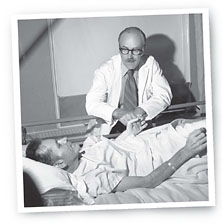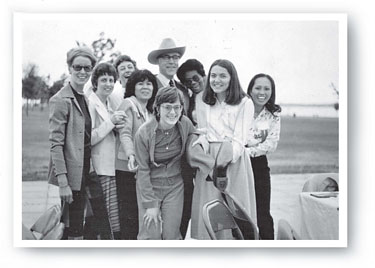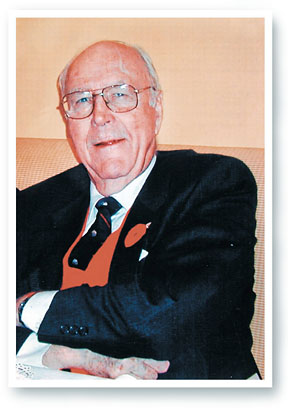 heavy
workload and helped generations of foreign neurological trainees and their
families adapt to North American ways. They had 4 children, moulded by their
happy home life. Although Robb never seemed quite certain about the role of
women in medicine, the eventual addition to the family of a physician
daughter-in-law seemed to tilt the scales in a favourable direction. Sociable
and friendly, a droll raconteur, Robb was a wonderful host.
heavy
workload and helped generations of foreign neurological trainees and their
families adapt to North American ways. They had 4 children, moulded by their
happy home life. Although Robb never seemed quite certain about the role of
women in medicine, the eventual addition to the family of a physician
daughter-in-law seemed to tilt the scales in a favourable direction. Sociable
and friendly, a droll raconteur, Robb was a wonderful host.

(Above) Preston Robb speaking with a patient, summer
1973. (Right) Dr. Robb with the Neuro Nurses in 1992.
In
1982 Robb was made Professor Emeritus of Neurology at McGill. He had always said
that he did not want to be under-foot when he retired as Neurologist-in-Chief.
True to his word upon retirement he moved to Lyn, Ontario
where he embarked on a second,
highly successful, career as Chairman of the Board of the family company and at
last had time to enjoy his hobbies of tree farming and wood carving.
During the long and satisfying years of our collaboration I came to appreciate
deeply two attitudes that set Preston Robb apart. The first was his desire to
understand the cultural and emotional background of his patients, often so
different from his own. This, he sensed, determined their reaction to
neurological disability in themselves and in their loved ones. The second was
his insistence that the physician do everything possible to create an
environment where patients and families were able to maintain their dignity
while coping with the dreadful hurdles that life placed in their path.
Preston Robb died at the age of ninety after a brief illness. He was in full
possession of his faculties to the end and gave a remarkable address after
receiving a Lifetime Achievement Award from the Montreal Neurological Institute,
just a week earlier.
6